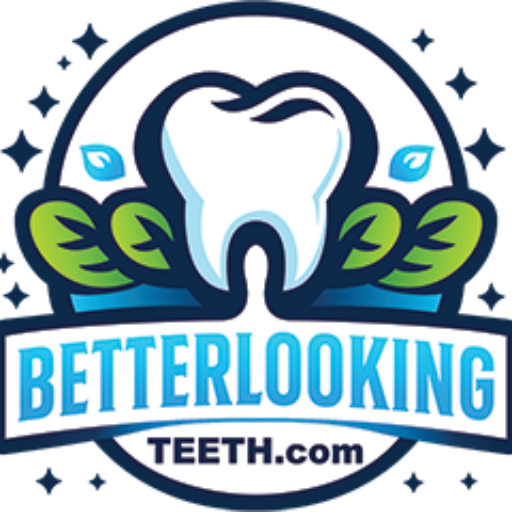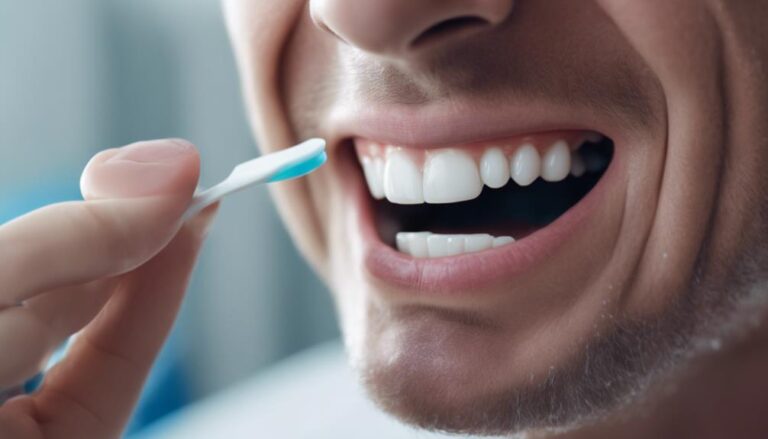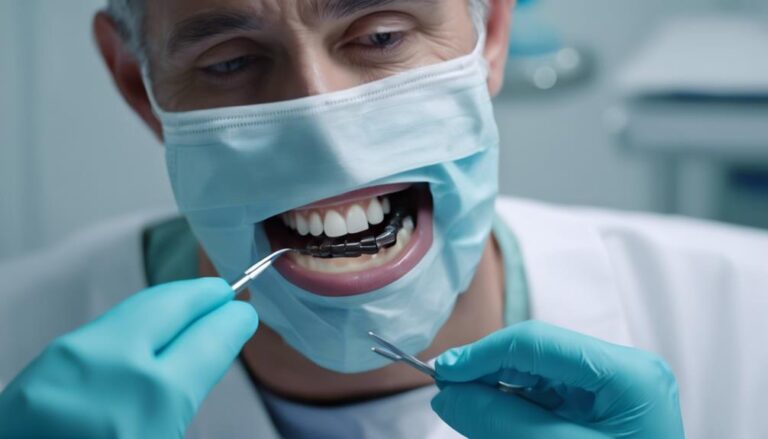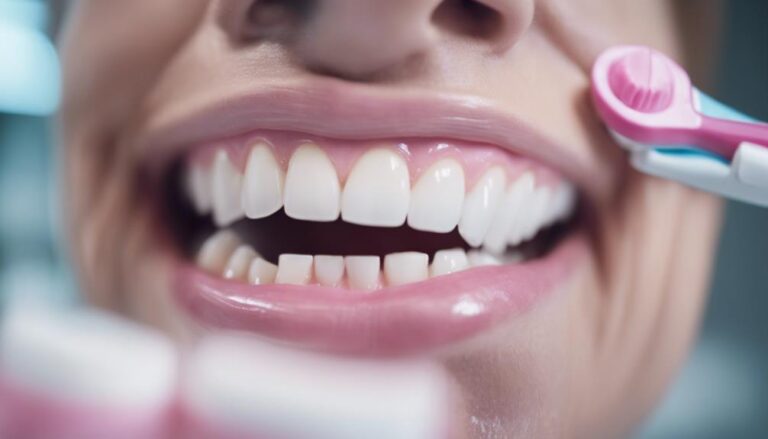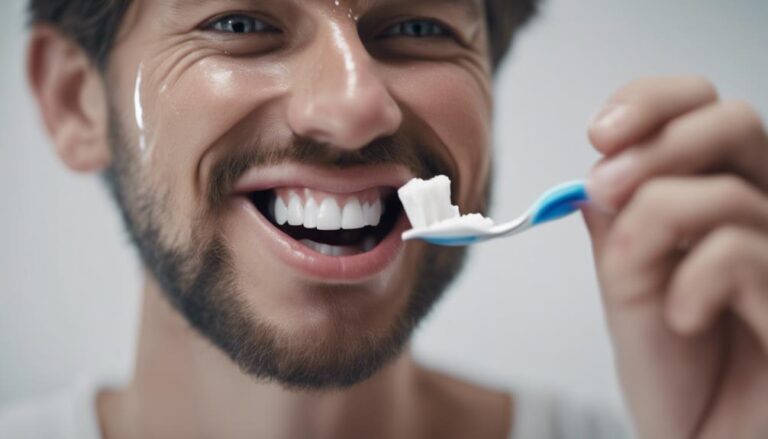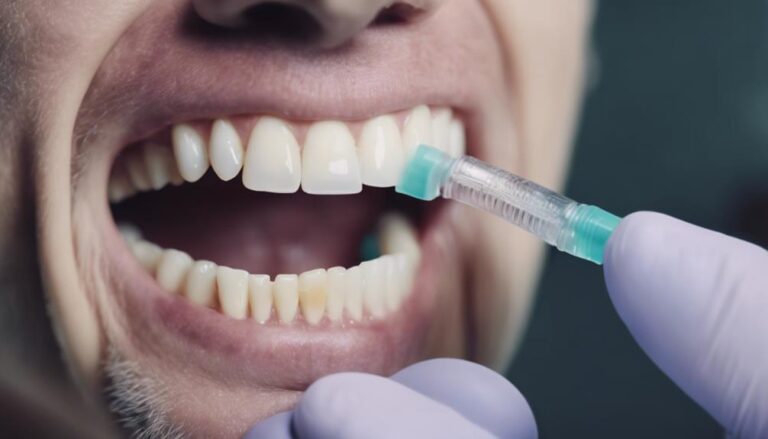I’ve learned that using mouthwash, following proper brushing techniques, and getting regular dental check-ups are key remedies for bad breath and gum disease. Mouthwash with antibacterial ingredients and essential oils can help reduce odor. Proper brushing, flossing, and using antibacterial toothpaste maintain gum health. Regular dental visits detect early signs of issues. Also, stress management and probiotics play a role in oral health. Exploring these remedies can greatly improve the freshness of breath and overall oral well-being.
Key Takeaways
- Effective mouthwash with antibacterial properties reduces odor-causing bacteria.
- Proper brushing techniques and flossing daily maintain gum health.
- Regular dental check-ups detect early signs of gum disease.
- Antibacterial toothpaste prevents plaque buildup and gum issues.
- Incorporating probiotics supports oral microbiome health and reduces oral health risks.
Mouthwash for Bad Breath
When combating bad breath, using an effective mouthwash can greatly reduce odor-causing bacteria in the mouth. Herbal remedies have been used for centuries to combat various health issues, including bad breath. Certain herbs like peppermint, parsley, and tea tree oil have natural antibacterial properties that can help freshen breath. Incorporating these herbal remedies into your mouth rinse can provide additional benefits beyond just masking odors.
Choosing a mouth rinse that contains ingredients like chlorhexidine, cetylpyridinium chloride, or essential oils such as eucalyptol, menthol, thymol, and methyl salicylate can effectively target and reduce the bacteria that contribute to bad breath. These ingredients work by killing bacteria and neutralizing odors, providing a long-lasting freshness.
It is essential to use the mouth rinse as directed on the label or as recommended by your dentist to achieve the best results. Consistent use of a quality mouthwash, along with proper oral hygiene practices, can significantly improve bad breath and promote overall oral health.
Proper Brushing Techniques
To maintain peak oral health and combat bad breath effectively, mastering proper brushing techniques is essential. Proper technique when brushing your teeth not only helps in removing plaque and food particles but also plays a vital role in maintaining gum health.
Start by selecting a soft-bristled toothbrush that can reach all areas of your mouth. Hold the brush at a 45-degree angle to your gums and use gentle, circular motions to clean the front, back, and chewing surfaces of your teeth. Be sure to brush for at least two minutes, covering all areas thoroughly.
Pay special attention to the gum line, where bacteria tend to accumulate and cause gum disease. Avoid brushing too hard, as this can damage the gums and enamel. Remember to replace your toothbrush every three to four months or sooner if the bristles are frayed.
Dental Check-Ups Importance
Regular dental check-ups are essential for maintaining excellent oral health and preventing potential issues. These routine visits play a vital role in ensuring ideal oral hygiene and addressing any developing problems promptly. During these appointments, dentists can thoroughly assess your mouth, teeth, and gums, detecting early signs of gum disease, cavities, or other oral health issues. By identifying these issues early on, preventive care measures can be implemented to avoid further complications.
In addition to addressing existing problems, dental check-ups also involve professional cleaning to remove plaque and tartar buildup that can’t be easily eliminated through regular brushing and flossing. This cleaning process helps prevent gum disease and cavities, contributing to the overall health of your mouth.
Furthermore, regular dental visits allow for discussions on proper oral hygiene techniques tailored to your specific needs. Dentists can provide valuable insights and recommendations to enhance your daily dental care routine, promoting long-term oral health and reducing the risk of developing serious dental issues.
Antibacterial Toothpaste Benefits
Utilizing antibacterial toothpaste can greatly enhance oral hygiene by targeting harmful bacteria that contribute to bad breath and gum disease. It’s an essential step in preventive oral care due to its ability to combat bacterial growth effectively. Here are some key benefits of using antibacterial toothpaste:
- Gum Disease Prevention: Antibacterial toothpaste helps in preventing gum disease by reducing the build-up of plaque and tartar, which are major contributors to gum inflammation and periodontal disease.
- Oral Hygiene Improvements: By eliminating harmful bacteria in the mouth, antibacterial toothpaste not only freshens breath but also promotes overall oral health. It aids in maintaining a clean and healthy mouth environment.
- Protection Against Cavities: The antibacterial properties of this toothpaste also play a role in protecting against cavities by preventing the formation of acids that can erode tooth enamel.
Incorporating antibacterial toothpaste into your daily oral care routine can greatly benefit your oral health by preventing gum disease, improving oral hygiene, and safeguarding against common dental issues.
Flossing for Gum Health
Maintaining excellent gum health involves incorporating flossing into your daily oral hygiene routine. Flossing is important for removing plaque and food particles stuck between teeth, which can lead to gum disease if left unaddressed. The benefits of flossing extend beyond just cavity prevention; it helps in maintaining the health of your gums by preventing inflammation and reducing the risk of gingivitis.
To promote excellent gum health, it’s essential to floss at least once a day. When flossing, make sure to use proper technique by gently guiding the floss between each tooth in a C-shape motion to reach below the gumline. Avoid snapping the floss against your gums, as this can cause irritation and damage.
Incorporating flossing into your daily routine is a simple yet effective way to promote gum health and prevent gum disease. By taking the time to floss correctly and care for your gums, you can maintain a healthy smile for years to come.
Tongue Scraping Tips
For ideal oral hygiene and fresher breath, incorporating tongue scraping into your daily routine can be highly beneficial. Proper tongue hygiene is essential for maintaining a healthy oral microbiome and reducing the risk of bad breath and gum disease. Here are some tips to effectively scrape your tongue:
- Choose the Right Tool: Use a tongue scraper made of either metal or plastic. Gently place it at the back of your tongue and scrape forward towards the tip. Avoid applying too much pressure to prevent irritation.
- Scrape Regularly: Make tongue scraping a part of your daily oral care routine, preferably in the morning before brushing your teeth. This helps remove bacteria, food debris, and dead cells that accumulate on the tongue overnight.
- Clean Your Tongue Scraper: After each use, rinse the tongue scraper thoroughly with warm water and store it in a dry place. Regularly sanitize the scraper to prevent the buildup of harmful bacteria.
Healthy Diet Impact
A balanced diet rich in nutrients plays an important role in maintaining oral health and preventing conditions like bad breath and gum disease. Nutrition impacts our oral health greatly, and making wise dietary choices can positively influence our overall well-being. Incorporating foods high in vitamins, minerals, and antioxidants supports healthy gums and teeth. Additionally, lifestyle habits such as limiting sugary snacks and beverages can help prevent tooth decay and gum issues.
Good oral hygiene practices combined with a nutritious diet are essential for combating bad breath and gum disease. Brushing and flossing regularly, along with consuming foods that promote oral health, can reduce the risk of developing these conditions. It’s key to remember that what we eat directly affects our teeth and gums. Therefore, being mindful of our dietary choices and their impact on oral health is essential to maintaining a healthy mouth. By prioritizing nutrition and oral hygiene, we can work towards preventing bad breath and gum disease effectively.
Oil Pulling Benefits
Oil pulling, an ancient practice rooted in Ayurvedic medicine, has gained popularity for its potential benefits in improving oral health. I’ve explored the advantages of oil pulling using both coconut oil and sesame oil:
- Coconut oil benefits, mouth hygiene:
Coconut oil is rich in lauric acid, known for its antimicrobial properties. When used for oil pulling, coconut oil can help reduce harmful bacteria in the mouth, potentially improving overall mouth hygiene.
- Sesame oil advantages, oral wellness:
Sesame oil contains antioxidants and anti-inflammatory properties that can benefit oral health. Through oil pulling with sesame oil, these properties may help in reducing plaque formation, promoting healthier gums, and fresher breath.
- Overall effectiveness:
Both coconut oil and sesame oil have shown potential in improving oral health through oil pulling. Regular practice of oil pulling with either of these oils may contribute to better oral hygiene and fresher breath.
Water Intake Importance
Ensuring sufficient water intake is essential for maintaining excellent oral health and preventing various dental issues. Hydration benefits not only the body but also play an important role in gum health. Adequate water consumption helps in keeping the mouth moist, which is significant for saliva production. Saliva is a natural defense mechanism that washes away food particles, neutralizes acids, and helps prevent tooth decay and gum disease. Dehydration can lead to dry mouth, increasing the risk of bad breath and bacterial growth, ultimately impacting oral hygiene.
| Benefits of Hydration for Oral Health |
|---|
| Helps in saliva production |
| Washes away food particles |
| Neutralizes acids in the mouth |
| Prevents tooth decay |
| Reduces the risk of gum disease |
Incorporating adequate water intake into your daily routine is a simple yet effective way to support your oral health. It is recommended to drink water throughout the day and especially after meals to promote saliva flow and maintain excellent oral hygiene.
Natural Remedies for Bad Breath
How can natural remedies effectively combat bad breath and promote fresher breath throughout the day?
Natural remedies offer a holistic approach to tackling bad breath by addressing the underlying causes. Here are some herbal solutions that can help freshen your breath:
- Green Tea: Drinking green tea can help combat bad breath due to its high antioxidant content and ability to reduce bacteria in the mouth.
- Parsley: Chewing on fresh parsley leaves can act as a natural breath freshener due to its chlorophyll content, which helps neutralize odors.
- Peppermint Oil: Peppermint oil, when used in mouthwash or applied directly to the tongue, has antimicrobial properties that can reduce the bacteria causing bad breath.
These natural remedies not only target bad breath but also provide additional health benefits. Incorporating these herbal solutions into your daily routine can contribute to fresher breath and overall oral health.
Professional Cleaning Benefits
One key aspect of maintaining excellent oral health is the regular professional cleaning benefits that can greatly improve gum disease symptoms and combat bad breath effectively. Professional cleanings play an important role in preventing gum disease and maintaining healthy gums. These cleanings are more thorough than regular at-home oral hygiene routines, as they can reach areas that may be missed during daily brushing and flossing. Dental hygienists use specialized tools to remove plaque and tartar buildup, which are major contributors to gum disease. By having regular professional cleanings, individuals can greatly reduce the risk of developing gum disease and experiencing related symptoms such as bad breath.
In addition to the cleaning itself, dental professionals can provide valuable oral hygiene tips during these visits. They can offer personalized advice on how to improve oral care practices at home to complement the benefits of professional cleanings. Maintaining healthy gums through regular professional cleanings is a cornerstone of preventing gum disease and ensuring excellent oral health.
Stress Management Techniques
To effectively manage stress and its impact on oral health, incorporating proven techniques into daily routines is essential. Stress relief plays an important role in maintaining overall well-being, including oral health. Here are three effective stress management techniques that can help improve both mental health and oral hygiene:
- Meditation: Engaging in regular meditation practices can help reduce stress levels and promote relaxation. By focusing on the present moment and practicing mindfulness, individuals can lower their cortisol levels, which in turn can have a positive impact on oral health.
- Deep Breathing Exercises: Deep breathing exercises are simple yet powerful tools to combat stress. By taking slow, deep breaths, individuals can activate their body’s relaxation response and alleviate feelings of tension and anxiety that may contribute to oral health issues.
- Progressive Muscle Relaxation: This technique involves tensing and then relaxing different muscle groups in the body. Progressive muscle relaxation can help release physical tension, reduce stress, and promote a sense of calmness, which can ultimately benefit oral health.
Quit Smoking for Oral Health
Managing stress is vital for maintaining oral health, and one important step towards improving oral hygiene is quitting smoking. Smoking not only stains teeth and contributes to bad breath, but it also greatly increases the risk of gum disease and oral cancer. Nicotine and other chemicals in cigarettes restrict blood flow to the gums, impairing the body’s ability to fight off infections and heal properly. Quitting smoking is essential for preserving not just oral health but overall well-being.
To support individuals in their journey to quit smoking, healthcare providers may recommend nicotine replacement therapies like patches, gum, or lozenges. These products can help manage withdrawal symptoms and cravings, making the quitting process more manageable.
In addition to quitting smoking, developing good oral hygiene habits is crucial. Regular brushing, flossing, and dental check-ups are vital for preventing gum disease and maintaining a healthy mouth. By quitting smoking and prioritizing oral hygiene, individuals can greatly improve their oral health and overall quality of life.
Gum Massage Techniques
Implementing gentle gum massage techniques can greatly enhance oral health and contribute to overall well-being. Proper gum care is essential for maintaining healthy teeth and gums. Here are some benefits of incorporating gum massage into your oral hygiene routine:
- Improves Circulation: Gentle massage helps increase blood flow to the gum tissues, promoting healing and reducing inflammation.
- Relaxation Techniques: Gum massage can serve as a form of stress relief, helping to relax the muscles in the jaw and face, which can contribute to improved overall oral health.
- Enhances Oral Hygiene: Massaging the gums can help dislodge food particles and plaque, complementing regular brushing and flossing to prevent gum disease.
Incorporating gum massage into your daily oral care routine not only benefits your oral health but also provides a moment of relaxation and self-care. Remember to use gentle pressure and circular motions when massaging your gums to avoid causing any damage.
Probiotics for Oral Health
Exploring the role of probiotics in oral health reveals a significant avenue for enhancing overall dental well-being and combating common issues like bad breath and gum disease. Probiotic supplements contain beneficial bacteria that can positively influence the oral microbiome, promoting a healthy balance of microorganisms in the mouth. Research studies suggest that these ‘good’ bacteria can help reduce the levels of harmful bacteria responsible for causing bad breath and contributing to gum disease.
The connection between oral health and gut health is becoming increasingly evident, with the oral microbiome playing an important role in overall well-being. By introducing probiotics into your oral care routine, you may not only improve your breath freshness but also support the health of your gums and teeth.
Incorporating probiotic-rich foods or supplements into your diet could potentially lead to a more balanced oral microbiome, thereby reducing the risk of oral health issues. Consider discussing with your healthcare provider or dentist about the potential benefits of incorporating probiotics into your oral health regimen.
Frequently Asked Questions
Can Bad Breath Be a Sign of Other Health Issues?
Bad breath can indicate underlying health issues like digestive problems. It’s crucial to maintain good oral hygiene and seek medical advice if symptoms persist. Addressing these concerns early can prevent potential complications and improve overall well-being.
How Can I Prevent Bad Breath Caused by Sinus Problems?
To prevent bad breath from sinus issues, I use nasal irrigation and hydrate well. Probiotics help balance my system. Mouthwash keeps my breath fresh. It’s a routine that combats the root cause effectively.
Are There Any Specific Foods That Can Worsen Bad Breath?
Certain dietary habits can worsen bad breath. Foods like garlic and onions can contribute to halitosis. Maintaining excellent oral hygiene, including brushing and flossing regularly, can help combat the effects of these foods on breath freshness.
Can Stress and Anxiety Contribute to Bad Breath?
Stress impacts oral health, potentially worsening bad breath. The anxiety connection can lead to dry mouth, a breeding ground for odor-causing bacteria. Managing stress through relaxation techniques and regular dental care can help combat bad breath.
Is There a Link Between Hormonal Changes and Bad Breath?
Yes, hormonal changes can impact bad breath. Hormonal imbalances and diet play a significant role. Oral hygiene is vital during hormonal fluctuations. Consistent brushing, flossing, and regular dental check-ups help combat bad breath linked to hormonal changes.
Conclusion
Well, there you have it folks! With these top remedies for bad breath and gum disease, you’ll be on your way to fresh breath and healthy gums in no time.
Remember to:
- Use mouthwash
- Brush properly
- Visit your dentist regularly
- Use antibacterial toothpaste
- Floss
- Manage stress
- Quit smoking
- Try gum massage
- Consider probiotics
Your smile will thank you! Just remember, bad breath and gum disease don’t stand a chance against these remedies.
Keep smiling!
